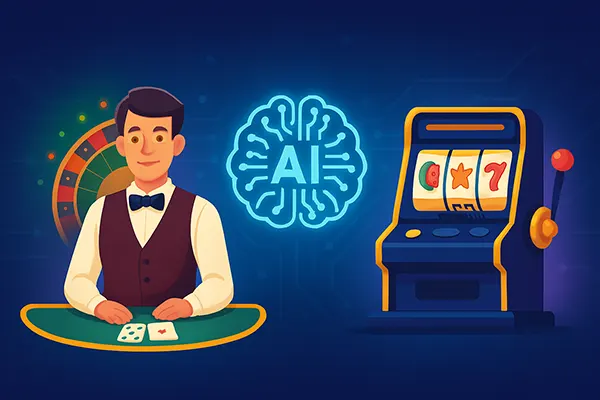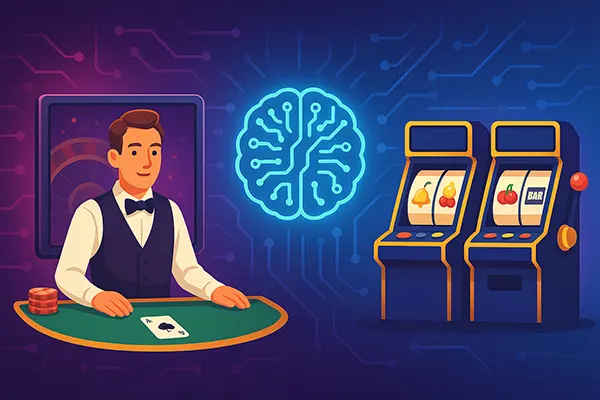How Artificial Intelligence Is Transforming Gambling: From Live Dealers to Adaptive Slots

Artificial intelligence (AI) is rapidly reshaping numerous industries, and the gambling sector is no exception. From real-time interactions with live dealers to personalised slot experiences, AI is not just a futuristic buzzword—it’s becoming a core part of how modern online casinos operate. By February 2025, its influence is seen in almost every corner of digital gambling, offering smarter gameplay, better security, and a more tailored experience for users.
AI and the Evolution of Live Dealer Games
Live dealer games have come a long way since their inception. Thanks to AI, online platforms can now offer real-time video streams with enhanced features such as automatic card recognition, intelligent betting suggestions, and fraud detection mechanisms. These advancements ensure smoother interactions and a fairer gaming environment.
AI-driven analytics also allow live dealers to interact more naturally with players. For instance, the system can detect betting patterns and mood indicators to adjust the pace or level of engagement accordingly. This creates a more immersive and human-like atmosphere, despite the remote setup.
Moreover, AI is being used to train live dealers through simulations, enhancing their response times and decision-making skills. This reduces human error and increases the overall quality of service provided by live casino platforms.
Improving Real-Time User Engagement
Real-time personalisation is now a critical component of live gaming. AI algorithms monitor how long a player stays at the table, their preferred games, and how they react to specific dealers. With this data, platforms can suggest rooms, adjust difficulty levels, or offer real-time rewards to keep engagement high.
Platforms like Evolution Gaming and Playtech are already integrating adaptive AI to optimise user satisfaction. This includes voice and facial recognition in certain test markets, although privacy laws remain a hurdle for full-scale deployment globally.
Such innovations not only improve the user experience but also increase the efficiency of casino operations. By automatically managing table allocations and dealer rotations, AI ensures smoother gameplay and less downtime.
Adaptive Slot Machines and Predictive Play
One of the most impressive applications of AI in gambling is its role in adaptive slots. These machines don’t just spin randomly—they learn. Using behavioural data, AI can adjust volatility, reward frequency, and themes to suit each player’s preferences, making every session feel uniquely tailored.
For example, if a player consistently leaves a game after five minutes without a bonus, the AI might increase the chances of a reward earlier in the session. While these mechanisms are tightly regulated to avoid manipulation, they help retain user interest in competitive markets.
Slot developers such as NetEnt and Pragmatic Play are at the forefront of implementing adaptive elements in their latest releases. This includes dynamic soundtracks, real-time bonuses, and even storyline progressions based on user choices.
Data-Driven Game Design
Beyond gameplay, AI is redefining how slot games are designed. Studios use AI to analyse thousands of hours of play to determine what keeps users engaged. This results in better graphics, more engaging themes, and mechanics that are statistically more enjoyable.
These insights are also helping developers create responsible gambling features. For instance, if a player shows signs of compulsive behaviour, the system might trigger a cool-off period or suggest taking a break, based on historical data models.
AI thus acts as both an innovator and a regulator—balancing excitement with ethical responsibility in the evolving world of slot machines.

Responsible Gambling and AI Safeguards
With great power comes great responsibility. AI systems in 2025 are equipped to detect signs of gambling addiction faster and more accurately than ever. By analysing behaviour patterns—such as frequency, wager sizes, and time spent—these tools can alert support teams or initiate automatic interventions.
Many European-regulated casinos are now legally required to integrate AI-based harm prevention tools. These include personalised limit suggestions, automatic reality checks, and notifications sent when risky behaviour is detected. The UK Gambling Commission and Malta Gaming Authority have both praised such systems for their preventive value.
Moreover, AI-powered chatbots are being used not only for customer service but also for early-stage emotional support. If a user expresses frustration or distress, the bot can escalate the issue to a human representative trained in responsible gambling protocols.
Building Trust Through Transparency
Transparency remains key. In 2025, casinos must disclose how AI is used in their systems, particularly in responsible gambling tools. This fosters user trust and ensures compliance with emerging legislation in markets like Germany, Sweden, and Ontario.
Players are also given access to personal gambling reports generated by AI. These reports break down spending habits, trends, and offer recommendations, empowering players to make informed decisions about their gameplay.
By making AI a transparent ally rather than a hidden mechanism, gambling platforms are building long-term loyalty and a safer environment for users around the world.





